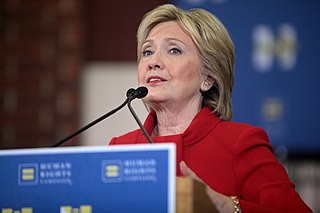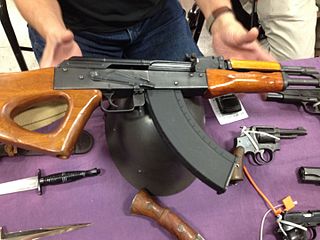Related Research Articles

The National Rifle Association of America (NRA) is a gun rights advocacy group based in the United States. Founded in 1871 to advance rifle marksmanship, the modern NRA has become a prominent gun rights lobbying organization while continuing to teach firearm safety and competency. The organization also publishes several magazines and sponsors competitive marksmanship events. According to the NRA, it had nearly 5 million members as of December 2018, though that figure has not been independently confirmed.

The Brady Handgun Violence Prevention Act, often referred to as the Brady Act, the Brady Bill, or the Brady Handgun Bill is an Act of the United States Congress that mandated federal background checks on firearm purchasers in the United States. It also imposed a five-day waiting period on purchases until the National Instant Criminal Background Check System (NICS) was implemented in 1998. Introduced by U.S. representative Chuck Schumer of New York, the Brady Act was a landmark legislative enactment during the Clinton administration. The act was appended to the end of Section 922 of title 18, United States Code. The intention of the act was to prevent persons with previous serious convictions from purchasing firearms.

Gun politics is defined in the United States by two primary opposing ideologies concerning the private ownership of firearms. Those who advocate for gun control support increasingly restrictive regulation of gun ownership; those who advocate for gun rights oppose increased restriction, or support the liberalization of gun ownership. These groups typically disagree on the interpretation of the text, history and tradition of the laws and judicial opinions concerning gun ownership in the United States and the meaning of the Second Amendment to the Constitution of the United States. American gun politics involves these groups' further disagreement concerning the role of firearms in public safety, the studied effects of ownership of firearms on public health and safety, and the role of guns in national and state crime.

Brady: United Against Gun Violence is an American nonprofit organization that advocates for gun control and against gun violence. It is named after former White House Press Secretary James "Jim" Brady, who was permanently disabled and later died in 2014 as a result of the Ronald Reagan assassination attempt of 1981, and his wife Sarah Brady, who was a chairwoman of the organization from 1989 until her death in 2015.
Robert Allen Ricker was a member of the board of directors and Executive Director of the American Hunters and Shooters Association who resigned on January 6, 2009 after accusing gun manufacturers of "irresponsible" and "negligent" behavior.

Hillary Clinton, the nominee of the Democratic Party for president of the United States in 2016, has taken positions on political issues while serving as First Lady of Arkansas, First Lady of the United States (1993–2001); as U.S. Senator from New York (2001–2009); and serving as the United States Secretary of State (2009–2013).

Gun show loophole is a political term in the United States referring to the sale of firearms by private sellers, including those done at gun shows, that do not require the seller to conduct a federal background check of the buyer. This is also called the private sale exemption. Under U.S. federal law, any person may sell a firearm to a federally unlicensed resident of the state where they reside, as long as they do not know or have reasonable cause to believe that the person is prohibited from receiving or possessing firearms, and as long as the seller is not "engaged in the business" of selling firearms.
The American Hunters and Shooters Association (AHSA) was a United States-based non-profit 501(c)(4) organization which operated from 2005 to 2010. The group described itself as a national grassroots organization for responsible gun ownership and advocated for increased gun control. The organization's president, Ray Schoenke, said the AHSA was intended to bridge the gap between urban liberals and rural gun owners, but closed down due to a lack of support from the Obama administration.

Proposition B in Missouri was a failed 1999 ballot measure that would have required local police authorities to issue concealed weapons permits to eligible citizens. It was a contentious issue and was narrowly rejected at the time by the electorate, but the legislature later approved similar legislation in 2003.

Everytown for Gun Safety is an American nonprofit organization which advocates for gun control and against gun violence. Everytown was formed in 2013 due to a merger between Mayors Against Illegal Guns and Moms Demand Action for Gun Sense in America.

The gun control policy of the Bill Clinton administration was the White House's domestic policy on guns during Bill Clinton's term in office as President of the United States from 1993 to 2001. Gun control was a major political issue in the first half of Clinton's first term and during that time he lobbied for, and signed, two major pieces of gun control legislation, the Brady Bill and the 1994 Federal Assault Weapons Ban.

On December 14, 2012, a mass shooting occurred at the Sandy Hook Elementary School in Newtown, Connecticut, United States. The perpetrator, 20-year-old Adam Lanza, shot and killed 26 people. 20 of the victims were children between six and seven years old, and the other six were adult staff members. Earlier that day, before driving to the school, Lanza fatally shot his mother at their Newtown home. As first responders arrived at the school, Lanza killed himself, shooting himself in the head.
The December 14, 2012, Sandy Hook Elementary School shooting—in which a gunman shot and killed his mother at home, 20 students, 6 teachers, then himself—received international attention. Governments and world leaders offered their condolences, while tributes and vigils by people were made in honor of the victims. U.S. President Barack Obama gave a televised address on the day of the shootings, saying, "We're going to have to come together and take meaningful action to prevent more tragedies like this, regardless of the politics." Obama paused twice during the address to compose himself and wipe away tears, and expressed "enormous sympathy for families that are affected". He also ordered flags to be flown at half-staff at the White House and other U.S. federal government facilities worldwide in respect for the victims. Three days after the massacre, 151,000 Americans had signed up at the Obama administration's We the People petitioning website in support of a renewed national debate on gun control. Obama attended and spoke at an interfaith vigil on December 16 in Newtown, Connecticut.

An Act Concerning Gun Violence Prevention and Children's Safety, also known as Public Law 13-3 or Connecticut Senate Bill No. 1160, is a bill concerning gun laws in Connecticut. The legislation was introduced by Senator Donald Williams in the state senate and by House Speaker Brendan Sharkey in the state House of Representatives. It was cosponsored by Rep. Ezequiel Santiago, Rep. Matthew Ritter, Rep. Matthew Lesser, Rep. Larry B. Butler, Rep. Auden Grogins, Rep. Patricia A. Dillon, Rep. Catherine F. Abercrombie, and Senator Andres Ayala. The bi-partisan bill passed the Senate by a vote of 26 to 10 and the House of Representatives by a vote of 105-44 on April 3, 2013.
The NICS Improvement Amendments Act was passed in 2007 in the wake of the Virginia Tech shootings in order to address loopholes in the National Instant Criminal Background Check System, commonly known as NICS, which enabled Seung-Hui Cho to buy firearms despite having been ruled a danger to himself by a Virginia court.
Faiths United to Prevent Gun Violence is a United States faith-based, interdenominational gun control advocacy organization.
After the Sandy Hook Elementary School shooting, multiple gun laws were proposed in the United States at the federal and state levels. The shooting renewed debate about gun control. The debates focused on requiring background checks on all firearm sales, and on passing new and expanded assault weapon and high-capacity magazine bans.

The Assault Weapons Ban of 2013 was a bill introduced in the 113th United States Congress as S. 150 by Senator Dianne Feinstein, D-CA, on January 24, 2013, one month after the Sandy Hook Elementary School shooting. It was defeated in the Senate on April 17, 2013 by a vote of 40 to 60.

Proposals for universal background checks would require almost all firearms transactions in the United States to be recorded and go through the National Instant Criminal Background Check System (NICS), closing what is sometimes called the private sale exemption. Universal background checks are not required by U.S. federal law, but at least 21 states and the District of Columbia currently require background checks for at least some private sales of firearms.

Public opinion on gun control in the United States has been tracked by numerous public opinion organizations and newspapers for more than 20 years. There have also been major gun policies that affected American opinion in the 1990s. Throughout these polling years, there are different gun control proposals that show promise for bipartisan action. Over the years listed there have been mass shootings, most notably school shootings, that have affected public opinion. There have also been a growth in states around the United States taking more drastic measures on gun control.
References
- ↑ "Brady gun-control organization gets new president". USATODAY.COM.
- ↑ "Brady gun-control group elects president". UPI. 6 February 2012.
- ↑ "Changing Culture".
- ↑ "Metro Matters; The Shots That Changed His Life". The New York Times. 1 June 2000.
- ↑ Alec MacGillis (28 May 2013). "The NRA's End: A Real Gun-Control Movement Has Arrived - New Republic". New Republic.
- ↑ John Cassidy (7 May 2013). "How Can We Defeat the N.R.A.?". The New Yorker.
- 1 2 Clift, Eleanor (2015-10-05). "The New Crusade for Gun Control". The Daily Beast.
- ↑ Evaluation of the ASK Campaign in Two Midwestern Cities | ISRN Public Health
- ↑ Michele Richinick (5 September 2014). "Brady Campaign's 'Bad Apple' initiative targets irresponsible gun dealers - MSNBC". MSNBC.
- ↑ Mallory Simon, CNN (1 February 2013). "Gun debate: Where is the middle ground?". CNN.
{{cite web}}:|author=has generic name (help) - ↑ "A Conversation with Brady Campaign President Dan Gross". The Institute of Politics at Harvard University. Archived from the original on 2013-04-06.
- ↑ "Gun Control talk: off limits?". NBCNews.com.[ dead link ]
- ↑ "When will the Brady Center get out the big guns?". The Aspen Times.
- ↑ Dana Milbank (27 October 2015). "The gun-control movement retreats to revitalize itself". Washington Post.
- ↑ Joseph P. Williams. "Eyes on the Prize: Gun Control Advocates see Success on the Horizon - US News". U.S. News & World Report.
- ↑ David Nakamura (4 January 2016). "Obama details executive action on gun restrictions". Washington Post.
- ↑ "Hillary Clinton Accuses Bernie Sanders of Not Standing Up to Gun Lobby". The New York Times. 12 January 2016.
- ↑ "Hillary Clinton Makes Appeals to Black Voters in South Carolina". The New York Times. 25 February 2016.
- ↑ "I've Discovered the Antidote to This Year's Nasty Election: TED". WIRED. 20 February 2016.